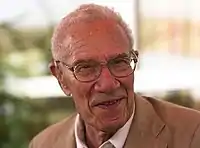Robert Solow
Robert Merton Solow (August 23, 1924 – December 21, 2023) was an American economist. He was known for his work on the theory of economic growth that grew in the exogenous growth model. It was named after him. He was awarded the John Bates Clark Medal (in 1961) and the 1987 Nobel Prize in Economics.[1] He won the Nobel Prize for studying how countries grow economically.[2]
Robert Solow | |
|---|---|
 | |
| Born | August 23, 1924 New York City, New York, U.S. |
| Died | December 21, 2023 (aged 99) Lexington, Massachusetts, U.S. |
| Nationality | United States |
| Institution | MIT |
| Field | Macroeconomics |
| School or tradition | Neo-Keynesian economics |
| Alma mater | Harvard University |
| Contributions | Exogenous growth model |
| Awards | John Bates Clark Medal (1961) Nobel Memorial Prize in Economic Sciences (1987) National Medal of Science (1999) Presidential Medal of Freedom (2014) |
| Information at IDEAS / RePEc | |
Solow was born on August 23, 1924 in Brooklyn, New York City.[3] He studied at Harvard University. Solow married Barbara Lewis in 1945. They had two sons and one daughter.
Solow died on December 21, 2023, at his home in Lexington, Massachusetts, at the age of 99.[4]
References
- "The Sveriges Riksbank Prize in Economic Sciences in Memory of Alfred Nobel 1987". NobelPrize.org. Retrieved 2020-07-14.
- "The Sveriges Riksbank Prize in Economic Sciences in Memory of Alfred Nobel 1987". NobelPrize.org. Retrieved 2021-05-11.
- Robert Merton Solow (1924– ). Library of Economics and Liberty (2nd ed.). Liberty Fund. 2008.
{{cite book}}:|work=ignored (help) - Hershey, Robert; Weinstein, Michael. "Robert M. Solow, Groundbreaking Economist and Nobelist, Dies at 99". The New York Times. Archived from the original on December 21, 2023. Retrieved December 21, 2023.
Other websites
- Video Interview with Solow from NobelPrize.org
- Articles written by Solow for the New York Review of Books
- Robert M. Solow – Prize Lecture
- Solow in the Tropics. By John Toye. History of Political Economy, 41, 1: 221–240
- IDEAS/RePEc
- Robert M. Solow Papers, 1951–2011 and undated. Rubenstein Library, Duke University.
This article is issued from Wikipedia. The text is licensed under Creative Commons - Attribution - Sharealike. Additional terms may apply for the media files.